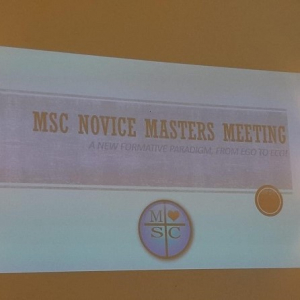Peter MALONE
War Hunt/ 2022
WARHUNT
US, 2022, 93 minutes, Colour.
Robert Knepper, Jackson Rathbone, Mickey Rourke.
Directed by Mauro Borelli.
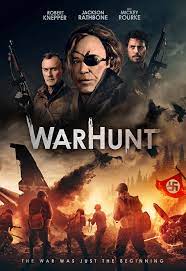 A small budget World War II action film filmed in Latvia. It is one of those films that used to go “straight-to-video”. It also a horror film.
A small budget World War II action film filmed in Latvia. It is one of those films that used to go “straight-to-video”. It also a horror film.
This is one of those war films focusing on a particular platoon, a mission, interactions amongst the men, then disaster descending on them. The tone of the film is set by the opening, a plane in flight, mysterious cluster of birds, the plane crashing.
The mission for the men, in France, 1944, part of the country occupied by the Germans, is to find the plane and survive. However, the commander, Major Johnston, played by Mickey Rourke, confronts the leader of the expedition, Robert Knepper, and insists that an extra man, played by Jackson Rathbone, accompanying the group in the search.
So far, so ordinary – but atmospheric, and much of the action in the dark and during the night.
The group come upon a mysterious windmill, one man looking in seeing naked women. They also capture a German prisoner who refuses to speak.
And then strange things begin to happen, a guard encountering a woman and then shooting her. And reluctant to real reveal the truth to the men. The German prisoner mutters in German, witches. Then the plane is found, but the men all disappeared. But, the special agent finds the role of film that he was sent for.
What follows is a list of horror occasions, the finding of corpses, one sewn up but nothing inside, and one of the soldier having hallucination of his girlfriend coming to see him, the leader losing his mind… The special agent and one of the men search of the windmill which has disappeared. However, they find the right light and venture into the windmill which, of course, has many many rooms, corridors, tunnels, basements, and confrontations with the witches.
Major Johnston also turns up, a copy of a second book which has been searching for for years also in the windmill. He and the agent finish as the last two survivors, their finding mustard gas, masks, fighting anniversaries, the major losing his mask and dying, the agent emerging… But to what kind of world?
In the basement is an enormous tree, in blue light, the Tree of Life, which has been nourished by the blood of dead soldiers – enabling spectre soldiers to arise, and that Hitler could use these two when the war control Europe!
Armageddon Time
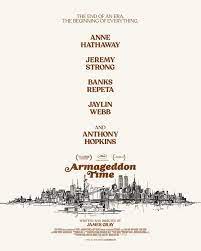
ARMAGEDDON TIME
US, 2022, 115 minutes, Colour.
Banks Repeta, Anthony Hopkins, Anne Hathaway, Jeremy Strong, Jaylin Webb, Ryan Sell, Andrew Polk, Tovah Feldshuh, John Diehl, Jessica Chastain.
Directed by James Gray.
No, not an apocalyptic science fiction adventure. Rather, it is a New York family drama. Near the opening, there is a clip of Ronald Reagan being interviewed for television, commenting on the world and dangers and suggesting that the era might be Armageddon. There is another clip at the end of the film with the Graf family upset when Ronald Reagan is elected president.
This is the family drama of three generations of the Grafs. The principal focus is on the younger generation, particularly Paul, beginning secondary school at the local public school whereas his older brother, Ted, is at an upmarket college. At first glance, Paul looks rather angelic. However, we see him drawing a caricature of the (rather obnoxious) schoolteacher, then seeing that he has a mischievous streak, mocking the teacher, supporting the black student, Johnny (a very effective Jailin Web), target of snide prejudice, repeating the year. His family think that Paul is rather slow, his mother, keen on education and preparing to run for local office (Anne Hathaway), his father a mixture of both genial support and strap-hitting discipline (Jeremy Strong), bewildered as Paul has emotional tantrums, forthright disobedience, clashes with his snooty brother.
But, hope is always possible. And this is in the form of Paul’s grandfather, another wonderful performance by Anthony Hopkins. His grandfather has a soft spot for Paul, encouraging him in his art, always with wise advice, not afraid of challenging his grandson, encouragement rather than angry discipline. And Hopkins has some fine monologues, reminiscing about his mother in Ukraine, the Cossacks and killings, her young age, escaping through the continent, marrying in Liverpool, coming to America and determined to succeed. It is a plaintive speech about the Jewish migrants of the early 20th century.
Fortunately for Paul, and the trouble that he gets into, his grandfather is there always is support – and challenge.
The young actor, Banks Pereto, gives a very nuanced performance, irritating the audience at first as Well Is annoying his parents, puzzling about his mischievous behaviour, and his daydreams of becoming successful artist, his befriending of Johnny and inviting him to his cubby house, his being forced to leave school and friends and go to his brother’s snobby (and racist) school, the audience becoming more and more understanding and sympathetic towards him, even, perhaps, conniving with his plan to steal a computer from school and he and Johnny run away to a successful future, He Is an artist, Johnny working for NASA, in Florida.
As we watch the film, it seems very much a memoir, Paul writing his story 40 years on. And, in fact, Paul’s life and ambitions parallel those of the writer-director, James Gray (a celebrated director with such films as little Odessa, The Immigrants, Ad Astra). Which means then that despite Paul’s difficulties in 1980, he does have a happy and successful future ahead of him.
And that is Jessica Chastain in a cameo, the ambitious speech to the students, as Donald Trump’s sister, Maryanne.
This is a very well-made film, always interesting, moments of challenge, a look back at New York society and American society in 1980, the Reagan era, financial leadership, the decade of Wall Street. While the family is Jewish, there is nothing particularly religious about the atmosphere, except the grandfather’s funeral. Worth seeing.
- The title and expectations? Armageddon and final times? Song by the Clash? Pessimistic? The clip with Ronald Reagan, his comment about Armageddon times? The US, 1980, the prelude to the 1980s and the Reagan administration? The final clip, his election, the family critical of his election?
- The 1980s setting, atmosphere, costumes and decor, cars…? The US political Background, after the Carter years, anticipation of the Reagan years? American society, prosperity, aiming for success, finance, the importance of money? (The decade of Wall Street and “greed is good”?)
- The New York setting, the various neighbourhoods, home and interiors, the schools, public and private, the visit to the Guggenheim and the Kandinsky Art? The streets and buildings? The musical score?
- Paul and his story (seeming an autobiography in retrospect and the connection with the life of James Gray)? His age, at school, the class, the dominating teacher and his rebukes, the joint in the toilet, Paul and the sketch, intention to ridicule, the friendship with Johnny, the reprimands, discipline and their mocking the teacher? The audience response to Paul initially, irritation? Paul at home, his parents, his older brother, at the private school, his brother and their clashes? The situation with the meal, the spaghetti, his mother cooking, his wanting Chinese, the tantrum at the table, going to the phone to place the order, harsh with his mother? The response of his father? An indication of his temperament and behaviour?
- The introduction of the grandfather, his age, experience, his serious telling the story of his mother, the Ukraine, the killings, her moving through the continent, marrying in Liverpool, coming to the US, the spaghetti at Ellis Island, “bloody worms”? Her determination, prosperity, his inheritance, his growing up, success, his wife, her teaching at school, his pride in his daughter? His pride in Paul, their having conversations, his challenging him, supporting him on his art, the pencil kit? Continued advice, the happy scene with the rocket in the park?
- The family meals, arguments, criticism, the touch of the racist against African-Americans, some Jewish exclusivism? The aiming for prosperity, the father urging De Bono’s book on success? The continual references to money and success?
- The mother, her marrying her husband, his later comments about the family looking down on him because of trade, pride in her family, the PTA, intending to run for the local education board? Reactions to Paul? The father, trade, seeing him at work, his comic touches, his serious touches, discipline, severity with Paul, the belt and hitting him? The other relatives, and the meal discussions about where Paul should go to school, against the public school, for the private school?
- Paul and his friendship with Johnny, Johnny and his story, living with his grandmother, held back to repeat the class, the butt of the teacher’s attacks? The visit to the Guggenheim, his being fascinated by Kandinsky, the souvenir postcard? Their leaving, going to play the games in the arcade, the bonding between the two? Johnny, his age, wanting to go to Florida, fascination with NASA? Paul and his decision that he wanted to be an artist? His basic drawings? The drawing of the rocket, confiscated, having to do the required assignment, yet finding the rocket picture in the school display case?
- Paul, in difficulties, call to the principal, his mother’s reaction? Suspension? The decision to go to the private school, his brother, the uniform, the change of tone?
- Johnny coming to the school fence, the boys and racial prejudice, Paul and his being influenced, the promise to go to the concert, his pulling out? Johnny coming to the house, officials looking for him, his staying in Paul’s cubby house that his father built?
- The difficulties at school, the teachers, the art class, talking with the counsellor about running away? The difficulties at home, his father and discipline? The relatives? Yet talking with his grandfather, listening to him, the rocket sequence in the park, the bonding?
- Maryanne Trump and her exhortative speech at the school?
- The decision to run away, seeing the computers in the school, the suggestion to steal, packing, going to the school, the window, taking the computer, going to the pawn shop, the owner ringing the police, taking Johnny? Pursuing Paul? In the cell, the officer, his knowing Paul’s father, the job in the past, his letting Paul go? Paul not seeing Johnny again?
- Paul’s return home, the talk with his father? And the talk with his grandfather?
- His grandfather ill, the hospital sequence, his wanting to stay, the sequence at the graveside, his father talking with him, telling his son about the family snobbery about his trade?
- The family together, watching the television, Reagan’s election, their unhappiness with this result? The beginning of Armageddon time in the 1980s?
- Paul story stopping at the end of 1980 – but, considering James Gray’s success, happy endings in the future for Paul?
Wyrmwood Apocalypse
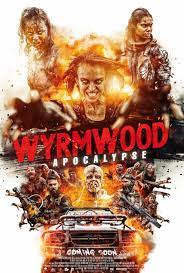
WYRMWOOD APOCALYPSE
Australia, 2021, 88 minutes, Colour.
Luke McKenzie, Shantae Tabor Barnes-Cowan, Jake Ryan, Bianca Bradey, Tasia Zalar, Jay Gallagher, Nicholas Boshier.
Directed by Kiah Roache-Turner.
In 2014 the Roache-Turner brothers made Wyrmwood: the Road, a horror film in the Australian bush, the two brothers writing together, Kaya acting as director and Tristan as producer. They also made a horror comedy film in 2018, Nekrotronic. They now return to their Wyrmwood themes.
On the whole, this horror film has satisfied the fans. It is very reminiscent of Mad Max themes, the apocalyptic open road, vehicles, confrontations and fights. But, it is also a zombie film. The Apocalypse has happened 10 years earlier but is continuing, humans transformed into zombies, their continually being rounded up, taunted with cooked food, tortured.
However, there is worse for some of them, the Surgeon General operating in an outback bunker, with technology, but also with sinister basements. And there are some details of the operations going on, torture and death, all for the sake of producing some serum from the zombies but, especially, from hybrids, serums which will help preserve the health of the survivors. The Surgeon General is dressed in yellow protective gear, repellent face, and attended by a range of thugs, many of them wearing protective gas masks.
The central character is Rhys, who for 10 years has been rounding up zombies and hybrids and delivering them to the Surgeon General. He is a loner, his brother having been killed. We see his trailer, getting up in the morning, exercises, revving his truck, going on his rounds. He does not question what he is doing, treated as a corporal by the Surgeon General and his underlings.
The film opens with a gory sequence so that we know where we sit. And there are some gory sequences throughout – seeming to satisfy fans’ expectations. We have seen some fugitives, two aboriginal women, one of them needing medication to survive but taken while the other escapes. She has an encounter with Rhys who then overpowers her, taking her to the Surgeon General, then having a change of heart and saving her.
There is also an encounter with other hybrids, especially the fearsome Brooke, sometimes fierce, aggressive, in need of medication, along with her protector, Barry.
As expected, there is a buildup to confrontations, fights, dangers, rescues, explosions, the death of the Surgeon General…
Finance invested by Screen Australia as well as Screen New South Wales, reminding world audiences that Australian can make small-budget horror films as well as anyone else!
On the Come Up
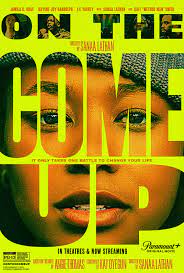
ON THE COME UP
US, 2022, 115 minutes, Colour.
Jamila Gray, Sanaa Lathan, Michael Cooper, Miles Gutierrez-Riley, Method Man, Da' Vine Joy Randolph, Justin Martin, Titus Makin Jr, Lil Yachty, Mike Epps.
Directed by Sanaa Lathan.
The title is that of a rap song that features in this drama about a young girl with talent, memories of her talented rap father and his death, her addict mother abandoning her but returning, her wanting success.
This is a film of particular interest to the African-American target audience. It will be welcomed by those who enjoy films about rap, the creativity of language, the interactions, insults, fights and challenges. For other audiences, it will depend on their interest in the characters and drama.
At the centre of the film is a 16-year-old school student, Bri (Jamila Gray), living with her mother who had abandoned her when young after the murder of her very successful rap artist father. She lives in or in memory of him. Her mother has taken control of her life but loses her job and is searching for employment. Bri has a brother was given up opportunities to support the family financially by working in a pizza takeaway. Bri does have some friends at school, Malik very supportive, and the gay Sonny who is coming out. Also in the act is her aunt, a big strong woman who wants to manage her, who in the past belong to the neighbourhood violent gangs.
While there are scenes at school and difficulties for Bri in selling candy (and falsely accused of selling drugs), there are also scenes at a venue for rap competitions, a boxing ring where the competitors stand up, singing, rap, where Bri is at first humiliated but returns and wins the competition.
There follows, rather rapidly, her rise to success, clashes with her aunt and management, taking up with a local DJ and other entrepreneurs, going to a recording studio, living the high life in the city with her friends, making the record which has very aggressive lyrics, becomes extraordinary popular, the school students chanting it and confronting the police (who had previously been very brutal and their treatment of Bri and the accusation of drug dealing). Bri is suspended from school, clashes with her friend Malik who accuses her of selling out. And she clashes with her mother and, again, with her aunt. And, she is attacked by gang members, her father’s necklace stolen from her and Malik punched and kicked. Her aunt intervenes, shot and taken to hospital.
So, the drama of the film is ambition, success and its unwanted consequences, reinterviewed by the local disk jockey, verbally attacked and walking out. She reconciles with her friends, her mother speaks up for her at a school and parents’ meeting, goes again to the competitive venue, is challenged and insulted, gets into the ring and gives not only as good as she gets but even more, being acclaimed the winner.
She has honoured her father. She has supported her mother, even in the rap lyrics. She is reconciled with her friends and her aunt. She is only 16 and the world is before her.
The film was directed by actress Sanaa Lathan and who appears as the mother.
MSC Novice Masters’ Meeting Rome.
MSC Novice Masters’ Meeting Rome.
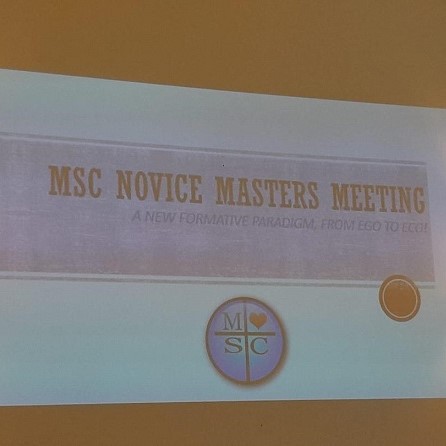
You will recognise various faces of novice masters from around the congregation. Australia’s representative is Khoi (despite the official list saying Peter Harvey Jackson, previous novice master – and taller than Khoi!) and Jonas from Cameroon who studied in Australian some years ago.
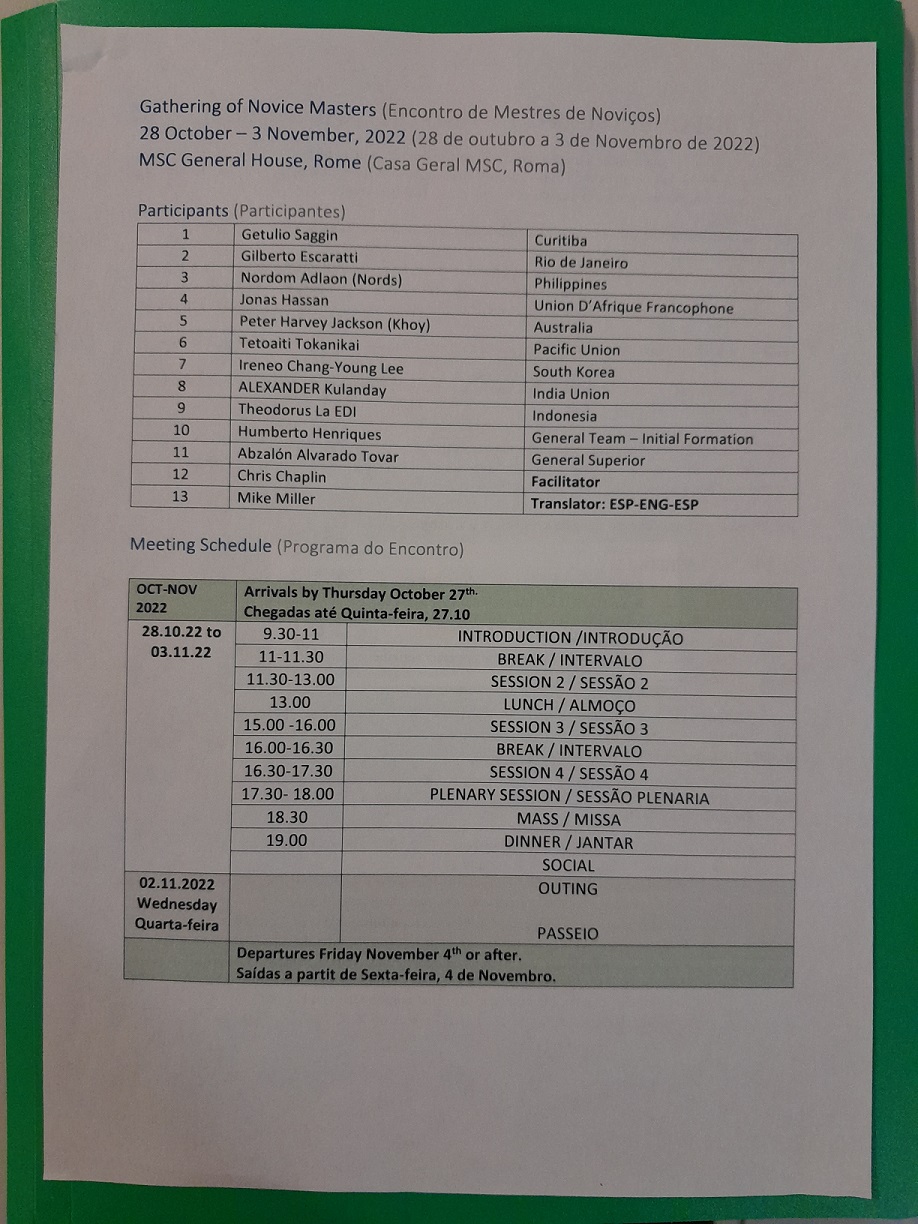
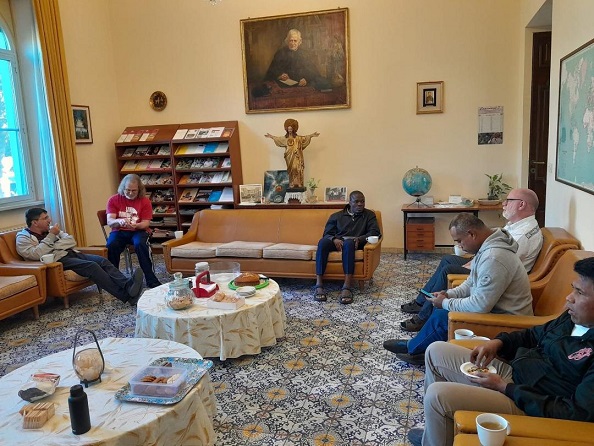
Presenting from the General Administration, Chris Chaplin and Humberto Henriquez. Also present Abzalon and Michael Miller.
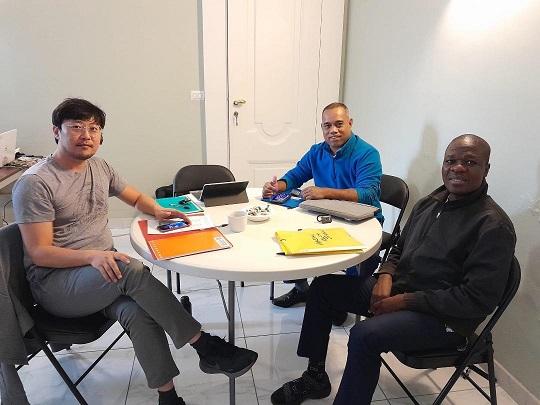
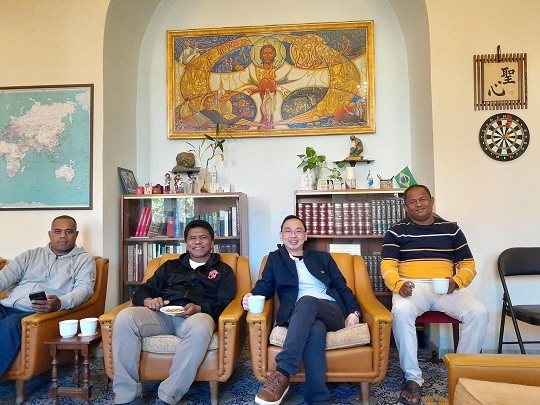
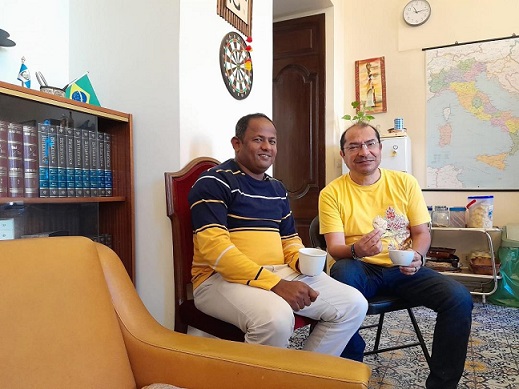
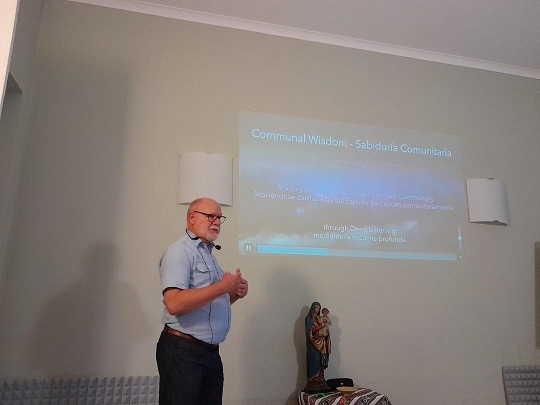
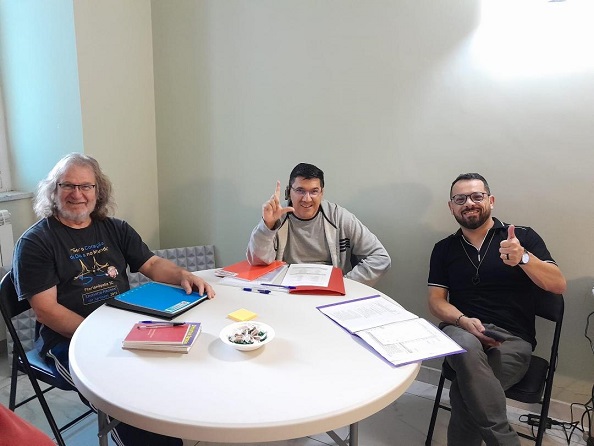
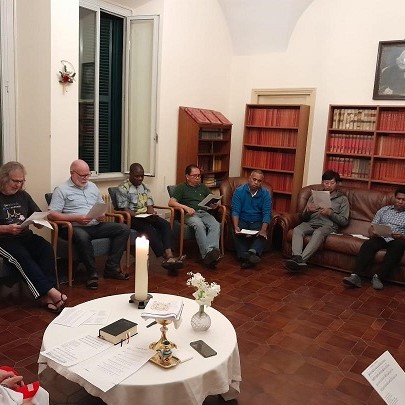
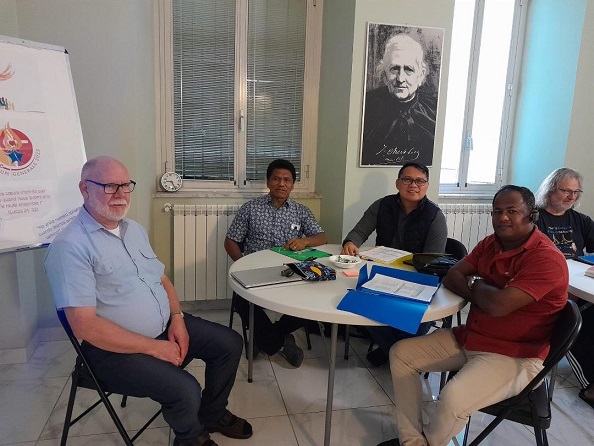
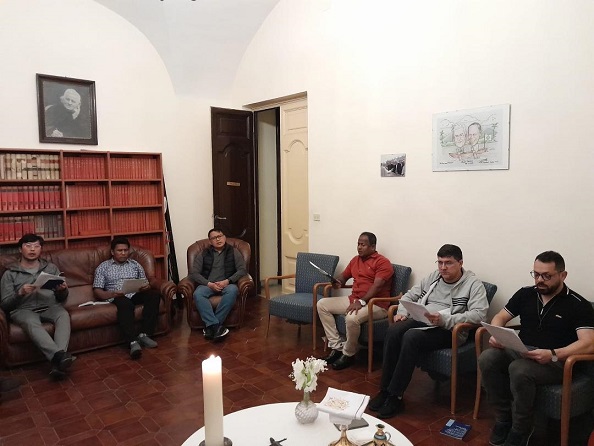
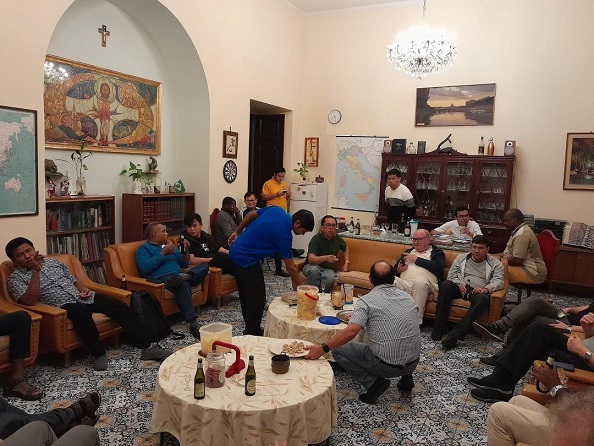
Takeover, The/ Holland
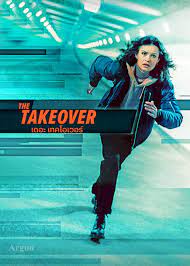
THE TAKEOVER
2022, 87 minutes, Colour.
Holly Mae Brood, Geza Weisz, Frank Lammers, Susan Radder, Walid Benmbarek, Jeremiah Fleming, Lawrence Sheldon.
Directed by Annemarie van der Mond.
This is a brief action film from Holland. The central character is an expert hacker, discovered at 16, continuing to supervise for companies, finding something wrong with a company’s system, sending out a Trojan horse to halt activities – with dire consequences. There was Run, Lola, Run – now there is Run, Mel, Run. Experts have made up a fake video of her killing the victim. She is going to the police, seeing thugs who are shooting at her and her boyfriend at the police station, gone on the run with him.
There is something frantic about her behaviour, contacting her friends on screen, contacting an old hacker, Buddy, whom she had put in to Interpol. He has liked Mel, turns up, tries to expose the fake video but is threatened by an international criminal who is trying to rectify the computer situations, especially for the participation of a Chinese company responsible to the Chinese government. This scenario and companies being hacked, references to the Chinese hackers, will resonate with many audiences.
The company is producing a driverless bus and, when it is launched, the electricity is put out of control and there is bus speeding along Rotterdam streets, echoes of 1994 is popular bus drama, Speed. And all ends well!
- Dutch drama? Settings in Holland and Belgium? Characters?
- The world of technology, IT, files and codes, companies and protection of information, shared information, illegal connections, hacking?
- The locations, the countryside, Rotterdam, the city, views, harbour, bridges, aerial views, buildings, bus routes…? The musical score?
- The prologue, the issue of hacking, interrupting workings, Buddy called in, his skills, tracking down the offender, discovering Mel at 16? Her skills? (The later filling out of the story, working with Buddy, then reporting him to Interpol because he was keeping the money from their work and exposes, his fleeing, no contact for years, his resentments?)
- Mel, 10 years later, as a personality, obsessed, her IT skills? Called in to the firm, the issue of the driverless buses, the international connections, the manager, her supporting Mel, Mel investigating, discovering the interference, sending the Trojan horse for disruption, the enormous international repercussions of this action?
- Mel, travelling on the bus, the security photo? The threats, the consequences of the Trojan horse? The contact visually with her working friends? Her going out with Thomas, the Chinese meal, his concoction, her decision to leave? Later coming to apologise? On the television showing her killing the man in the lane? With Thomas, the two men coming to the apartment, with the guns, shooting, the escape?
- Her having gone to the police, talking with the detective, about the disruption with the codes, her leaving, the escape, after seeing the two thugs at police headquarters? Going to Thomas, getting his help?
- Mel, on the run, realising that to prove her innocence and the murder sequence fake, the need to contact Buddy? She and Tom’s waiting for him? His turning up, forgiving her the past, his liking Mel? His working on the computers, his discoveries about the international interconnections?
- Rogers, the thugs, the pursuits, his frustrations, finding Buddy, holding the gun, shooting him? Mel and Thomas escaping, Rogers in pursuit, his car bogged and their escaping?
- The detective, his assistant, believing Mel guilty, changing his mind, going into action, Thomas connecting with him, the issue with the bus on the bridge? His going to the company, talking with the manager, her being abrupt, yet making the phone calls, and Rogers threatening her?
- The launch of the bus, the gathering, the speeches, photo identity, the champagne on the bus, the electricity failing, the bus out of control, echoes of 1994’s Speed?
- Mel, going to the company, Rogers tracking her down, their fighting? Her trying to rectify the situation? The detective arriving with the police, Rogers taken in? Mel, contact with Thomas in the car, the connection in the car, taking it to the bus, climbing onto the bus, into the bus, making the connection, stopping the bus at the edge of the water? The criminals raising the bridge for a crash?
- Mel, showing the detective the true killer, the imposition of her identity, proving her innocence?
- The expose of the manipulation of information, hackers, power? And, in this case, the Chinese connection and audience response to the history of Chinese hacking?
- And happy ending, Buddy’s tape and leaving her the money for a company and a future for Thomas and Mel? Yet her continued obsession?
Woman King, The
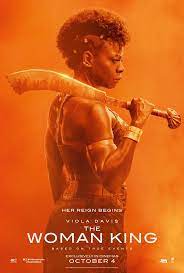
THE WOMAN KING
US, 2022, 135 minutes, Colour.
Viola Davis, Thusa Mbedu, Lashana Lynch, Sheila Atim, John Boyega, Hero Fiennes Tiffin, Jordan Bolger, Jimmy Odukoyo, Jayme Lawson.
Directed by Gina Prince-Bythewood.
Advertising and trailers seem to suggest that this is an African adventure in the Marvel Universe tradition of Black Panther. It is, in fact, a historical drama, set in 1823 in the West African territory of Dahomey, now part of the country of Benin.
Dahomey is presented as a prospering country, the opening of the film giving a historical context, the various tribes and nations surrounding it, hostilities. And, one of the key issues, is the African slave trade, the African rulers themselves negotiating with the British and, here, slave traders from Brazil. (In 10 years time, 1833, Britain will abolish slavery.).
Warfare is part of the culture. The film opens with a raid, fight and massacre, setting a tone for what is to happen. But, what is different, is that the leader of the raid is a woman warrior, Nanisca, fierce, determined, leading her troupe of women warriors as well as men. And, she is at the service of the young king, more open-minded, interested in trade in palm oil, wary of the slave trade. He is played with some dignity and wisdom by John Boyega.
For two centuries, the female warriors, the Agojie, have been defenders of the kingdom. Nanisca has spent her adult life training the warriors, there are quite a number of scenes of training, physical and psychological demands, the self-sacrifice of the women not marrying and committing completely to the Agojie, and severe physical tests of their prowess. Later, there will be some emotional investment in Nanisca as something is revealed of her early life. She is played by Viola Davis, who has shown over decades in films and on television, an extraordinary range of characters she has portrayed. She is in command here, ultimately being recognised for her leadership, becoming a woman King.
But, there is the next generation, especially the orphan, Nawi (South African actress Thusa Mbeda), refusing an arranged marriage, abandoned by her father, but finding her home, companionship, ideals, in becoming a champion Agojie.
The film also shows the slave traders, their ruthlessness, embodied in a young Portuguese entrepreneur, played by Hero Fiennes Tiffin, but a humane aspect in his friend, Malik, Brazilian father, slave mother from Dahomey, who is in search of his African heritage – and, as might be expected, encounters Nawi, a testing of her commitment to the Agojie.
The action builds up to a confrontation between the Agojie and the Dahomey warrior men, hand-to-hand combat, violent war sequences.
Audiences may be thinking that this is the climax to the story, the action, but, there are more complexities, Nawi taken prisoner, the role of the slave traders, Nanisca and her decision to raze the slave trading town.
In some ways, the action does resemble the African sequences and action from a Marvel movie which, as we watch, in some way diminishes the intended overall impact, the serious look at an African nation in the 19th century, the role of the protecting women warriors, the King, military leadership, and the impact of the slave trade and the rising up against it.
- A film of African history? Dahomey? Its status for several hundred years, kingdom? The repercussions of the slave trade? Warriors and defence? The Woman King?
- Location photography in Africa, the landscapes, the coast, the recreation of the villages, the King and the palace, the military enclosure? The musical score?
- The tone, the initial raid, led by Nanisca, the female warriors, the men, hand-to-hand combat, the brutality of war? The return in triumph?
- The political situation in the kingdom, the slave trade, the King’s brother, the new king, hopes for peace, the abundance of palm trees, the palm oil traded? The king, his age, decrees? His wives? His ambitious wife and her jealousies and connivance? The kings reliance on Nanisca?
- Nanisca, her story, the later revelation is, the rape, pregnancy, giving birth, her friend, the child given to the orphanage? The mark on the child’s back? Nanisca and training as a warrior, her strength and skills, formidable presence? Leader of the women? The women, in training, the scenes of training, the harsh obstacle competition, thorns, climbing? The women living in seclusion? Totally committed to the Agojie? The range of elders, their role with the women, a device, challenge?
- Nawi and her story, watching the parade, her friend, her father, the arranged marriage, the older man, slapping her, her slapping him back, the father denouncing her, taking her to the camp? The later revelation that she was an orphan? Her commitment to the Agojie, training, skills, the issue with the rope and her later using it as a weapon? Coming to the attention of Nanisca? Winning approval? Her life with the other women, competitive, the obstacle race, going back to help the other girl, winning? The triumph?
- The slave trade, the local kingdoms, the clashes with Dahomey, the African slave traders in their power? The Portuguese, Carlos and his connections, Malik as his friend? The presumptions about the slave trade? The connections with Brazil? The women in Brazil, Brazilian fathers, their children? The traders, the later scenes of the markets, selling the women?
- Nawi, encounter with the naked Malik, his later seeing her, the attraction, the meetings? Nawi and her commitment to the Agojie?
- The preparation for the Battle? The training, Nanisca and her leadership? The encampment, remembering Nawi’s talk of gunpowder not used in guns? The setting of the explosives, the fire? The combat, the brutality of war? Nawi down the cliff, the disappearance? The return in triumph? The appointment of the Woman King? The scheming of the wife, sitting in triumph, her downfall and the King’s rejection?
- The disappearance of Nawi, taken prisoner, her mentor as a prisoner, on the cart, Nawi telling her to fall off and save herself? The other two, the imprisonment, the market, the sales, the tactic interrupting the sale, the escape, the fights?
- Nanisca and her decision to defy the King, to lead her troops, to destroy the slave trade? The attack on the town, the fights, the brutal fight with the local slave trader, his defeat? Finding Nawi, her weapons, the rope? The death of the other friend? The burning of the town? Carlos, his being drowned? Malik, now we, the hopes, promises, her return to the Kingdom?
- The King, accepting the victory, the abolition of the slave trade, the palm oil trade, prosperity? And Nanisca reaffirmed as the Woman King?
Bros
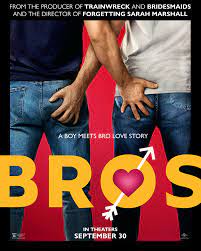
BROS
US, 2022, 115 minutes, Colour.
Billy Eichner, Luke McFarlane, Guy Branum, Miss Lawrence, TS Madison, Dot-Marie Jones, Jim Rash, cameos by Debra Messing, Ben Stiller, Kristin Chenoweth, Harvey Firestein, Amy Schumer.
Directed by Nicholas Stoller.
Bros is billed and marketed as a gay romcom. In many ways it is. It is the work of comedian-writer-actor, Billy Eichner, intending to tell gay stories, wanting them to be in the public entertainment arena in the same way as straight stories. It does not quite work out that way.
Audiences will know where they stand and whether they want to keep sitting watching the film during the first 15 minutes. It is quite in your face, very direct, frank, perhaps reinforcing the homophobic, but not entirely welcoming the broad audience.
For this reviewer and for many audiences, the issue is Billy Eichner himself. He is at the centre of the film, running his gay pod cast with lots of followers, an entrepreneur on the board of setting up the first LGBTQI+ Museum in New York City. But, he is 40, lives alone, tells us that he has never loved anyone and does not expect to do so. And he talks, and he talks, and he talks. Strong ego. And, on his pod cast, then in real life, he harangues everyone, he rants, is abrasive in his tone, is not particularly likeable, and, in fact, is unlikeable, dislikeable. So, hard going as the film begins.
On the one hand, Bros is the story of Rob’s attraction towards a lawyer, specialist in writing wills, Aaron who comes from upstate New York, is seen at the gay clubs, goes home with the various clients. But, Aaron, Luke McFarlane, is so much more sympathetic than Rob. The story tells the ups and downs of the relationship (sympathies with Aaron). The other part of the plot concerns the Museum, the meeting of the Board (represented committee of gay, lesbian, by, trans… who are far more interesting than Rob. And he treats them like everyone else. (And one does enjoy Rob’s comeuppance when he meets Debra Messing, pours out his troubles, and her response is to upbrade him, complaining that Grace is a character in a sitcom while all the gay men she meets want to ask her for advice and that she herself is more than that.)
There are actually some quiet romantic moments (when Rob pauses from talking). There are some comic moments in preparing the contents of the last wing of the Museum (and the ultimate visualising of what has been built). And, there are various quips, smart responses, and a lot of in-jokes with show business connections.
On the serious side, the sequences with Aaron’s mother and his about-to-be divorced brother, have quite some seriousness about children, education, exposure to the complexities of sexual orientation. But, Rob can’t help himself, rants against Aaron’s mother – with Aaron telling him (what we are all thinking) that he is relentless.
It would seem that this is a gay romcom (of the more promiscuous kind) that would resonate with New Yorkers and their culture rather than from quiet towns, It seemed a good idea to do some checking, looking at the blogs on the IMDb and discovering that most of them are quite negative towards Bros, complaining that the portrayals are not representative of most gay men, the bloggers wanting something more that they can identify with, and more subtly entertaining than Bros.
If only Rob were not so tiresome and wearisome for us all (as well as for Aaron who loves him).
Jaula/ The Chalk Line
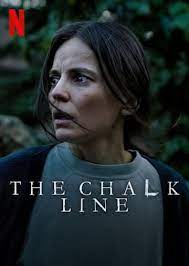
JAULA/ THE CHALK LINE
Spain, 2022, 104 minutes, Colour.
Elena Anaya, Pablo Molinero, Eva Tennear, Eva Llorach, Carlos Santos.
Directed by Ignacio Tatay.
An arresting Spanish drama. The Spanish title actually means Cage. The English title of The Chalk Line, illustrated throughout the film, is a very effective title.
This is a strong drama – which involves the audience and, perhaps, enables them to accept what, in strict realism, might not have happened in the way it is presented here.
A couple, Paula and Simon, driving home see a little girl in the middle of the road, a cyclist coming towards her and skidding, the girl not hurt, and the couple taking her to the hospital. She doesn’t speak. She is unwell, kidney troubles. She is kept at hospital.
The couple, especially Paula, a very keen to do what they can for the little girl whose name seems to be Clara. But, no speaking, and her fear of moving of the limits of the bed in hospital. The hospital psychologist tries to entice her to speak. Various visits to the hospital, Clara seeming to trust Paula, the decision then that she should go home with Paula and Simon.
So, some detail in Paula’s working with Clara, Clara eventually whispering into Paula’s ear, some tapes made of the whispering, the emergence of some German words. But, Clara can be cantankerous, refusing to play with the daughter of a neighbour. And, using the device of the chalk line, which can always be extended, Clara venturing more and more from enclosure. In the meantime, the neighbours come to visit, offering help and advice. And, also in the meantime, the audience sees Paula taking injections, hiding them from her husband, his discovering them and their discussions about this six years in trying to become pregnant.
When the authorities want to take Clara back to the hospital, Paula becomes more intense, especially in looking at a drawing that Clara has done – and Clara disappearing, reappearing, disappearing again. Paula becomes even more obsessive, going to the police with suspicions, her stealing records of similar cases of little girls disappearing, this taking her to the French police, and some discoveries in the files.
At which stage, the chronology goes back, repetition of sequences but, from the point of view of a neighbour who arouses Paula suspicions – and, then some revelations, some connections, the neighbour and his tension with his wife, and the final resolution.
Perhaps it seems less plausible is reflect on the film after it ends – but, while it is on the screen, it does involve us emotionally and with curiosity.
- The Title, literally “Cage”? The chalk line throughout the film?
- The Spanish setting, the highway, the hospital, the home, exteriors, the neighbours? Police precincts? The musical score?
- Paula and Simon, driving, the little girl on the road, the crash, taking her to the hospital, the mystery, their care?
- The little girl, age 6, not speaking, her health, beginnings of recovery? The nursing staff? The psychologist? Paula and Simon and the interest on visits? (And Paula and the later history of trying to be pregnant, her desire for a child, for six years, the injections, keeping at this secret from Simon and his feeling that she had taken this from him?)
- Paula, her age, motherly instinct, the visits to the hospital, the interactions with the little girl, the confines of the bed? Taking her home, drawing the chalk lines? Paula and Simon involved? His having to go to work, his care, but the main work for Paula?
- The neighbours, the visits, the meals and discussion, the audience taking the friends for granted – the mother and her pregnancy, the discussion about the birth date, Eduardo and audiences not noticing him much, the importance for later?
- Audience response to Paula and her care for Clara, the little girl, some German words and the later discoveries of the translations, her whispering to Paula, the yoghurt, the neighbour, refusing to play with the little girl? The bonding between Paula and Clara? The visits from the psychologist?
- The negative behaviour, the episodes with the glass in the drink, the pregnant mother, Paula? And the irony of discovery that Eduardo had put the glass in the drinks?
- Simon, worried, the confrontation about the injections and pregnancy? Paula, becoming more moody, the disappearance of Clara, later finding her with Simon? Her final disappearance, Paula and the police, stealing the files, reading them, making the link with Ingrid and her disappearance? Interviews in France?
- Paula, the return home, the drawing by Clara, Eduardo’s window, her ringing the police, told to stay put, but her going to the house, the confrontation with Eduardo?
- The change of direction of the screenplay, going back over the situations, highlighting Eduardo and his behaviour, suspicious, his relationship with his wife, the tension, the issue of the visits from their children? The final revelation of the abduction of Ingrid, Clara being her daughter? Clara, held in the basement?
- Paula, the visit, the confrontation with Eduardo, the discovery of Clara in the basement? Eduardo and hitting Paula with a hammer, chaining her? His discussions with his wife, lying in bed, his breakfast? Paula, opening the door, urging Clara to move, Clara extending the chalk line, to the back door, calling out to Simon, being found by Maite, taken back into the house, Maite in collusion with her husband, exercising her power?
- The police, the arrival, the arrest?
- The postscript, Clara with her grandparents in Hamburg, and communicating with Paula, Paula and her happiness?
Puppet Master, The: Hunting the Ultimate Conman
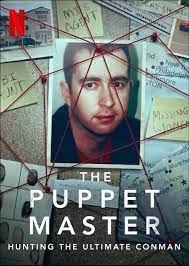
THE PUPPET MASTER: HUNTING THE ULTIMATE CONMAN
UK, 2021, 127 minutes, Colour.
Charlie Ives, Stephen Corrall, Richard Peter O'Sullivan, and the actual central characters as themselves.
Directed by Sam Bernstead, Gareth Johnson.
This is a Netflix documentary series, three parts, focusing on the notorious conman, Robert Freegard. This documentary was released in January 2022. Later that same year, there was a feature film on Freegard starring James Norton.
For those who watch the documentary series, first the drama with James Norton, Rogue Agent, brings the character himself to charming and sinister life, understanding him as a character. For those who watch the film first, the documentary dramatises two episodes which feature in Rogue Agent plus a narrative which takes place after Freegard was released from jail in 2009.
The documentary focuses on three episodes with Freegard, using the narrative device of a visual of a list of years, horizontally, and the camera moving backwards and forwards. The main story is that of the early part of Rogue Agent, Freegard working in a bar, choosing young students for training in security, telling them what he belong to MI5. He takes control of their lives, getting money from them and their families, one escaping, John Atkinson (who is interviewed, himself, extensively throughout the documentary), but the main attention given to Sarah Smith (Sophie in the feature film). Sophie and her fate are important to Road Agent, but here is the opportunity for Sarah Smith herself to speak to camera (dramatised, docudrama style, by actress Charlie Ives as Sarah but, later in the film, the actual Sarah Smith also appearing). In Rogue Agent, the third young person is visualised, having two children by Freegard and his appearing and disappearing in their lives. In the documentary, this is referred to verbally.
In both films, Sara/Sophie’s parents are significant, her being absent for 10 years, the initial visit from Freegard and the young people, Sophie’s disappearance, requests for money. There is a great deal of speaking to camera by Sophie’s father, played by actor, Peter Corrall, most convincing as the father.
With this story, the dates go backwards and forwards, especially to a story after Freegard’s release, two young people, with flashbacks to them in their younger days, then in the present, in 2021, discussing what happened to them and their mother, their love for her, separation from husband but his continued concern about her (also appearing with some forcefulness and emotion in the documentary), her disappearance with Freegard, calling himself David Hendy.
The documentary also opens up a third story, around 2003, concerning Freegard and his relationship with an American, her dependence on him, and someone willing connivance with him to say that she had been sitting for MI5 training courses and failing, requiring money from her parents to pay for these alleged courses. This story is also paralleled in Rogue Agent, filling out more details about the relationship between the two and the connection with the parents as well as the contact with the American Embassy in FBI agents. In the documentary, an agent speaks to camera at length about the situation, about investigations. An actor takes on the role of Scotland Yard officer, explaining investigations into Freegard, and the final setting up of the sting at Heathrow airport to arrest him, which is also dramatised as docudrama, but persuasively so that audiences would be thinking they were watching the real thing. Despite difficulties and the American mother not following the detailed plan of the sting, Freegard was arrested, in court, sentenced to life, an appeal, an argument that the taking of the people may have been psychological but not physical and therefore he was not guilty. He was released in 2009.
This is a kind of intriguing documentary that audiences appreciate. And, it is very interesting, to watch in connection with Rogue Agent where James Norton brings some of the reality of Robert Freegard to life (but there is significant dramatisation about is relationships, and a pursuit of him by one woman played by Gemma Arteton).
.
